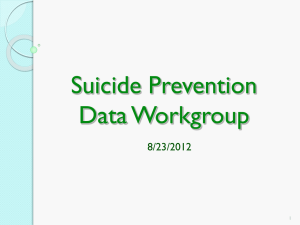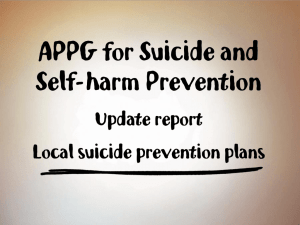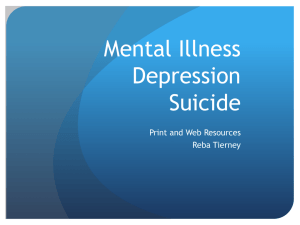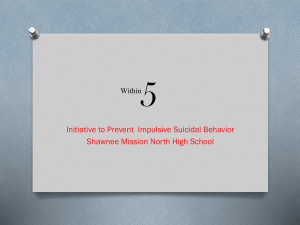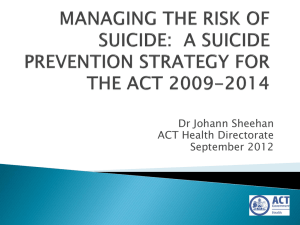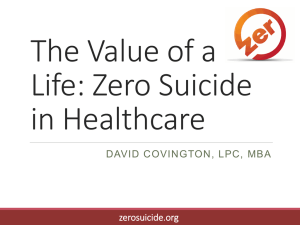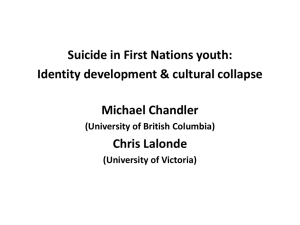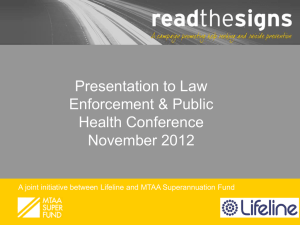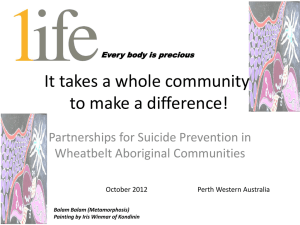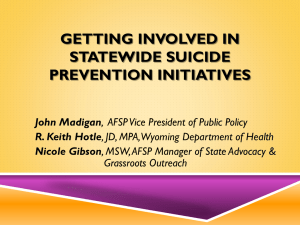this presentation
advertisement
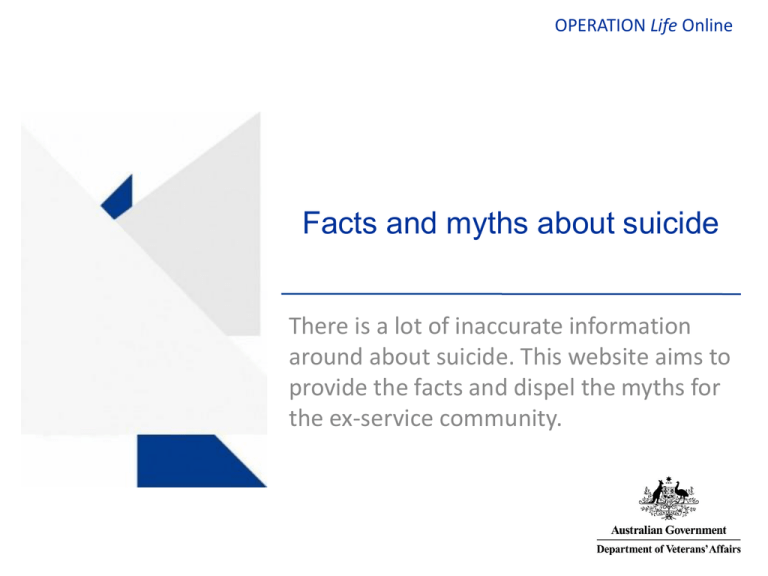
OPERATION Life Online Facts and myths about suicide There is a lot of inaccurate information around about suicide. This website aims to provide the facts and dispel the myths for the ex-service community. OPERATION Life Online Fact: The actual rate of suicide in the Australian Defence Forces is lower than in the general population The 2010 ADF Mental Health Prevalence and Wellbeing Study has identified that suicidal ideation and making a plan to suicide is higher in the ADF than the general population but the actual rate of suicide is lower. This suggests that there are protective factors that assist serving personnel to seek care. It is important that ex-serving personnel also understand the range of support options available to them. Hodson, S.E. McFarlane, A.C., Van Hooff, M. & Davies, C. (2011) Mental Health in the Australian Defence Force 2010 ADF Mental Health Prevalence and Wellbeing Study Executive Report accessible at http://www.defence.gov.au/DMH OPERATION Life Online Suicide in the ex-service community Professor David Dunt undertook a study to investigate the prevalence of suicide within the ex-service community. His study recommended the conduct of the 2010 ADF Mental Health Prevalence and Wellbeing Study. Professor Dunt’s study was inconclusive on whether suicide was more prevalent in the ex-service community than the general population. Dunt, D. (2009) Independent study into suicide in the Ex-service community accessible at http://www.dva.gov.au/healthandwellbeing OPERATION Life Online Fact: More men than women die by suicide each year in Australia Suicide is about four times more common in men than women. In Australia in 2010, 1,816 males and 545 females completed suicide. Source: Australian Bureau of Statistics (2012) Suicides Australia 2010 (Catalogue No. 33090.0) OPERATION Life Online Fact: There are known risk factors for suicide Knowing the risk factors for suicide helps to raise awareness and improve education to prevent suicide. To understand the risk factors for suicide in the ex-service community, click here. OPERATION Life Online Fact: There are known protective factors against suicide Protective factors are the positive conditions and social resources that promote wellbeing and reduce the potential for suicide (as well as other related high-risk behaviours). To understand protective factors against suicide in the exservice community, click here. OPERATION Life Online Fact: Belonging to the ex-service community can help to prevent suicide When an ex-service man or woman is in contact with other members of the ex-service community it provides them with a network of support that protects against suicide. Many suicides in the community can be prevented through suicide awareness raising education and activities within communities like VVCS’ Operation Life suicide prevention workshops. Please click here for VVCS website. However, suicides can still occur even when people are well connected to their community and if you know someone who has suicided, click here for more information. OPERATION Life Online Fact: Grieving after suicide is different to other types of death Grieving after suicide is different compared with other types of death as following a death by suicide, many grief responses are significantly intensified and may be overwhelming. As there is stigma attached to suicide, it is difficult for family and friends to grieve. There are always questions about ‘what if’ and ‘if only’. This is why support after death by suicide is very important. If you find that you or someone else you care about is dwelling on a death, including thinking about it when you or they don’t want to, you should seek help. Click here to seek help now OPERATION Life Online Myth: There is a typical profile for a person who dies by suicide People of all ages, races, faiths, and cultures die by suicide, as do individuals from all walks of life and all income levels. Popular, well connected people who seem to have everything going for them and those who appear less confident or vulnerable die by suicide. Suicidal people come from all kinds of families, rich and poor, happy and sad, two-parent and single parent, civilian and ex-service community members. OPERATION Life Online Myth: You should never ask someone if they are having suicidal thoughts Talking about suicide does not cause suicide to occur. In fact, it can be a good way to help prevent suicide. Asking someone “Are you thinking of suicide?” directly will give the person the opportunity and permission to talk about suicide. People who are not suicidal reject the idea, while people who may be thinking about it usually welcome the chance to talk about it. Often suicidal people are relieved because they feel that someone else recognises their pain. Talking breaks the secrecy of the person who is feeling suicidal, and lets them know that there is help available. By not talking about suicide, the isolation and despair felt by suicidal individuals can get worse. OPERATION Life Online Myth: I must honour my promise to keep secret that someone I know is going to suicide When someone tells you that they are thinking of suicide you must not agree to keep it a secret. Let them know that you need to involve others to keep yourself and the person at risk safe. Secrecy only increases the sense of stigma around suicide. OPERATION Life Online Myth: All suicidal people have a mental illness Not all suicidal people suffer from a mental illness. Ex-service men and women and others who appear to be happy, with "normal" lives and no history or mental illness have taken their own lives. Some people attempt suicide on an impulse, often under the affects of alcohol or drugs. Depression and anxiety and other forms of mental illness, if untreated, can lead to suicide, but mental illness is not the only factor that can lead to suicide. In fact, there may be many other contributing factors and some forms of mental illness may also protect against suicide. OPERATION Life Online Myth: Suicides always occur without warning Most suicidal people show warning signs before a suicide attempt. Some early warning signs include: crying, loss of interest in previously pleasurable activities, rage, anger, seeking revenge, acting reckless/engaging in risky activities, feeling trapped, increasing alcohol or drug use, withdrawing from friends, family or society, anxiety, agitation, unable to sleep/sleeping all the time, giving away possessions, dramatic changes in mood or no reason for living or sense of purpose in life. Some late warning signs include: someone threatening to hurt or kill themselves, looking for the means to kill themselves (gun, pills, rope etc.), and someone talking or writing about death, dying or suicide. OPERATION Life Online Myth: People who are suicidal always want to die People who are thinking of suicide are in pain and cannot find a reason to live more than wanting to die. OPERATION Life Online Myth: People who talk about suicide are unlikely to go through with it All conversations about suicide should be taken seriously, you might be the only person who has listened and acted to save a life. Whenever anyone tells you that they are thinking about suicide you must keep them physically safe and seek professional help for them by contacting a GP, VVCS or other support service. You must also ensure that you look after yourself and seek help if you need to talk about your experience. OPERATION Life Online Myth: There is nothing that can protect someone from suicide There are known protective factors against suicide which include: •Staying connected to a community; •Having a significant relationship with another person; •Participating in regular physical exercise and looking after your physical and mental health; •Financial security; •Personal skills and resilience; •Having a belief system; and •Talking to someone you trust about your thoughts and feelings and getting timely help. Click to read more about protective factors
